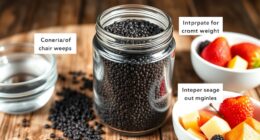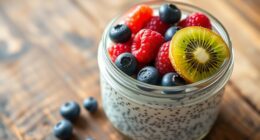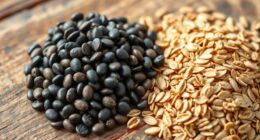You can use chia seeds as a plant-based way to boost your omega-3 intake since they’re rich in alpha-linolenic acid (ALA). While they don’t provide the same direct benefits as fish oil’s EPA and DHA, regular consumption can help meet your nutritional needs, especially if you prefer vegetarian or eco-friendly options. To understand how chia seeds compare fully and learn about other health benefits, keep exploring this topic further.
Key Takeaways
- Chia seeds are rich in ALA, a plant-based omega-3 fatty acid, but less potent than fish oil’s EPA and DHA.
- The body’s conversion of ALA to EPA and DHA is limited, making chia less efficient than fish oil for direct omega-3 benefits.
- Chia seeds offer a sustainable, plant-based alternative that supports environmental health and suits vegetarian or vegan diets.
- Regular consumption of chia can help maintain omega-3 levels, though it may require higher intake compared to fish oil.
- Combining chia seeds with other omega-3 sources can enhance overall intake, but they may not fully replace the immediate potency of fish oil.

Have you ever wondered how chia seeds can boost your health? These tiny seeds pack a powerful punch, especially when it comes to omega-3 fatty acids. Unlike fish oil, which is a common supplement for omega-3s, chia seeds offer a plant-based option that’s appealing to vegetarians and vegans. But can they truly replace fish oil? The answer depends on what you’re looking for and how you incorporate them into your diet.
Chia seeds offer a plant-based omega-3 alternative to fish oil for health-conscious, eco-friendly diets.
Chia seeds are rich in alpha-linolenic acid (ALA), a type of omega-3 that your body can convert into the more active forms, EPA and DHA, found in fish oil. While the conversion rate isn’t perfect, consuming chia seeds regularly can help you meet your omega-3 needs without relying on animal products. This makes them an excellent choice if you’re seeking plant-based options. Plus, they’re incredibly versatile—you can sprinkle them on oatmeal, blend them into smoothies, or add them to baked goods. Their neutral flavor ensures they blend seamlessly into your meals.
Choosing chia seeds over fish oil also benefits the environment. Fish oil production has a significant environmental impact, contributing to overfishing and harming marine ecosystems. By opting for plant-based omega-3 sources, you’re helping reduce the strain on ocean resources. This shift supports sustainable practices and promotes biodiversity. As more people look for eco-friendly alternatives, chia seeds stand out as a small but meaningful step toward reducing your ecological footprint.
In addition to their omega-3 content, chia seeds offer other health benefits. They’re high in fiber, which promotes digestion and helps regulate blood sugar levels. They also contain antioxidants, calcium, magnesium, and protein, making them a nutrient-dense addition to your diet. Because they’re plant-based and easy to incorporate, they’re a convenient way to boost your overall nutrition without the environmental concerns tied to fish oil extraction. Incorporating sustainable nutrition practices like choosing plant-based sources can have a positive impact on the environment.
While fish oil remains a potent source of EPA and DHA, you might find that including chia seeds in your diet provides a practical, environmentally conscious alternative. For those who prefer to avoid animal products or want to lessen their ecological impact, chia seeds are a smart choice. Just keep in mind that the omega-3s from chia seeds may not be as directly potent as those from fish oil, but with consistent intake, they can help you maintain healthy levels. Ultimately, whether you choose fish oil or plant-based options like chia seeds, making informed choices supports your health and the planet.
Frequently Asked Questions
How Does the Bioavailability of Omega-3s in Chia Seeds Compare to Fish Oil?
You might wonder about the absorption efficiency of omega-3s from chia seeds versus fish oil. Chia seeds contain ALA, which has lower bioavailability, meaning your body absorbs it less efficiently. In contrast, fish oil provides EPA and DHA, which are more nutrient stable and readily absorbed. So, while chia seeds are a good plant-based source, their omega-3s may not match the absorption efficiency of fish oil.
Can Chia Seeds Provide Sufficient Omega-3s for Heart Health Benefits?
Coincidentally, you might wonder if chia seeds can supply enough omega-3s for heart health. While they are a good plant-based omega-3 source, their nutritional comparisons to fish oil show lower bioavailability of EPA and DHA. To guarantee adequate omega-3 intake, incorporate chia seeds alongside other sources like fatty fish or consider supplements. Relying solely on chia seeds may not meet the omega-3 levels recommended for ideal heart health.
Are There Any Side Effects From Consuming High Amounts of Chia Seeds?
Eating high amounts of chia seeds can lead to potential side effects, especially if you have nutrient interactions or allergies. You might experience digestive issues like bloating or diarrhea due to high fiber intake. Also, allergic reactions are possible, causing symptoms like itching or swelling. It’s wise to consume chia seeds in moderation and consult with a healthcare professional if you notice adverse effects or have allergies.
How Do Cooking or Processing Methods Affect Omega-3 Levels in Chia Seeds?
Think of cooking methods as a gentle river shaping a stone. When you heat or process chia seeds, the impacts on omega-3s are like water wearing down rough edges. High temperatures or processing can reduce omega-3 levels, just like erosion. To keep their nutritional power, use gentle methods like soaking or adding seeds raw. This way, you preserve the omega-3s, ensuring maximum health benefits.
Is There a Recommended Daily Intake of Chia Seeds for Omega-3 Benefits?
You should consider the daily intake and dosage guidelines for chia seeds to maximize omega-3 benefits. Typically, consuming about 1 to 2 tablespoons (roughly 10-20 grams) daily provides a good amount of omega-3s. Incorporate chia seeds into your diet regularly, such as adding them to smoothies or yogurt. Always balance your intake with other omega-3 sources and consult health advice for personalized recommendations.
Conclusion
So, next time you’re looking to boost your omega-3 intake, consider chia seeds—they’re like tiny nutritional superheroes packed with plant-based power. While they may not completely replace fish oil for everyone, they’re a fantastic, versatile alternative that can transform your health journey. Think of chia seeds as a tiny army fighting for your well-being—powerful, persistent, and ready to help you conquer your wellness goals every day. Don’t underestimate their mighty impact!
















